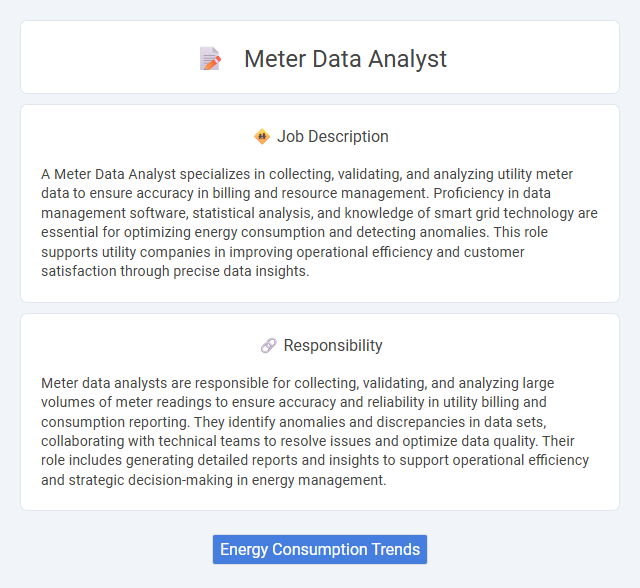
A Meter Data Analyst specializes in collecting, validating, and analyzing utility meter data to ensure accuracy in billing and resource management. Proficiency in data management software, statistical analysis, and knowledge of smart grid technology are essential for optimizing energy consumption and detecting anomalies. This role supports utility companies in improving operational efficiency and customer satisfaction through precise data insights.
Individuals with strong analytical skills and attention to detail are likely suitable for a Meter Data Analyst role, as the job involves interpreting complex data sets from utility meters. People who are comfortable working with data management software and have a patience for repetitive tasks may find this position aligns well with their strengths. Those who prefer dynamic, interactive environments might not be as suited, given the often solitary and data-focused nature of the work.
Qualification
A Meter Data Analyst requires strong proficiency in data analysis tools such as Excel, SQL, and Python, alongside experience with meter data management systems (MDMS) and smart grid technologies. Candidates should possess a degree in data science, engineering, statistics, or a related field, coupled with expertise in validating, cleansing, and interpreting utility meter data to ensure accuracy and compliance. Strong analytical skills, attention to detail, and knowledge of energy sector regulations are essential for optimizing meter data quality and supporting operational efficiency.
Responsibility
Meter data analysts are responsible for collecting, validating, and analyzing large volumes of meter readings to ensure accuracy and reliability in utility billing and consumption reporting. They identify anomalies and discrepancies in data sets, collaborating with technical teams to resolve issues and optimize data quality. Their role includes generating detailed reports and insights to support operational efficiency and strategic decision-making in energy management.
Benefit
A Meter Data Analyst position may offer benefits such as enhanced career growth opportunities due to the increasing demand for data-driven decision-making in utilities. Employees could likely experience improved technical skills and exposure to advanced data management tools. The role might also provide a chance for competitive compensation packages and job stability within the energy sector.
Challenge
Meter data analyst roles likely involve managing large volumes of complex data from smart meters, presenting challenges in ensuring data accuracy and consistency. The job probably requires advanced analytical skills to identify patterns, detect anomalies, and support energy consumption optimization. Adapting to evolving technologies and regulatory requirements could add to the complexity of these positions.
Career Advancement
Meter data analyst roles offer clear pathways for career advancement through gaining expertise in data interpretation, anomaly detection, and energy usage optimization. Progression often leads to senior analyst positions, data scientist roles, or management opportunities within utilities and energy companies. Mastery of advanced analytics tools and proficiency in smart grid technologies significantly enhance promotion prospects and salary growth.
Key Terms
Energy Consumption Trends
A Meter Data Analyst specializes in examining energy consumption trends by analyzing metered data from residential, commercial, and industrial users. Utilizing advanced data analytics tools and algorithms, they identify patterns, detect anomalies, and support energy efficiency initiatives. Their insights enable utilities to optimize load forecasting, reduce costs, and improve demand response strategies.
 kuljobs.com
kuljobs.com